Plant-based Diet Pete Evans
Vegans tend to get a bad rap, and for the average guy who could never imagine parting with steak forever, it may seem like a lifestyle with too many rules and very little reward.
While there are lots of solid reasons someone might decide to go vegan, such as concern for the environment or animals, you might also be interested in what a plant-based diet can do for your health.
It definitely has its upsides if you want to give it a shot: Research finds that people who eat a vegan diet may have an easier time losing weight and reduce their risk of chronic diseases.
That said, the best diet you can possibly follow is the one that works for you. So if you want to take a crack at going vegan and see if it aligns with your personal goals, there are a few things you should know first. If you're used to chowing down on cheeseburgers, it's probably going to be a big switch. But once you've decided to say goodbye to meat, milk, and eggs for good, keep the following tips in mind.
YOU'LL NEED TO RETHINK YOUR PROTEIN
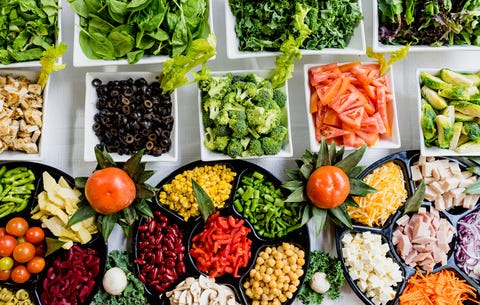
Unsplash
The first question you probably have about going vegan: But how will I get enough protein? It's a worthy concern. Protein keeps you full and helps repair the tiny tears that strength training creates in your muscles, helping them grow bigger.
The good news is, getting enough protein when you have a plant-based diet is not impossible. You just have to be a little creative about it.
Good sources of plant protein include beans, lentils, legumes, nuts, seeds, tofu, tempeh, and pea protein, says Vandana Sheth, R.D.N., C.D.E., spokesperson for the Academy of Nutrition and Dietetics.
While there's lots of talk in the health world about soy—the base for many vegan meat replacements and protein sources—and how it affects your health, know this: Soy does contain phytoestrogens, plant-based hormones that may lead to decreased testosterone levels when you eat too much. However, up to four servings a day shouldn't hurt, according to Men's Health nutrition advisor Alan Aragon, M.S. (Check out our full guide to protein sources here.)
Ideally, you want to aim for at least 30 grams (g) of protein per meal, but you might need to eat a little more than that if you're vegan, since plant proteins are typically lower in leucine, an essential amino acid that's crucial for growing and maintaining muscle, explains Men's Health nutrition advisor Mike Roussell, Ph.D., author of the Metashred Diet.
You need 2 to 3 g of leucine to get the maximum muscle-building benefits from a meal. Think of it this way: If you eat two cups of beans, you'll consume roughly 436 calories, 30 g of protein, and 2.4 g of leucine, explains Roussell. Compare that to 3.5 ounces of cooked top round beef, which will get you 161 calories, 30 g of protein, and 3 g of leucine. So if you're switching to a vegan diet, you might need to eat a greater portion of plant-based foods than if you were eating just meat alone, depending on your preferred source of plant protein.
"Plant proteins are a more inefficient way to optimize your protein intake," Roussell explains. "This means that if you go the plant protein route, you need to be conscious of this and make sure to account for the extra calories."
Related: How This Vegan Strength Coach Gets 194 Grams Of Protein a Day
YOU MIGHT MISS OUT ON CERTAIN NUTRIENTS
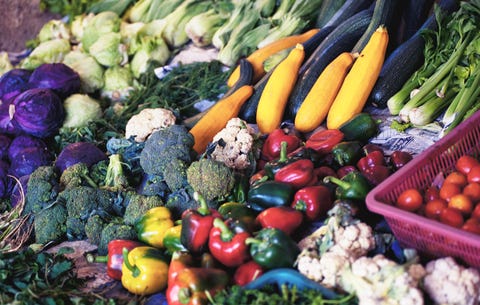
Unsplash
When you cut out meat, your diet may lack vitamin B12, one of the key nutrients of concern if you follow a strictly plant-based diet, says Sheth, since it's predominantly found in animal products.
Getting enough B12 is important since all B vitamins serve to convert the carbs you eat into glucose, your body's main source of fuel, according to the University of Maryland Medical Center. B12 also helps keep your nerve cells healthy, plays a role in producing your DNA and RNA, and teams up with vitamin B9 to make sure your red blood cells are working efficiently. When you don't get enough vitamin B12, you might get diarrhea, shortness of breath, or feel tired. Being severely deficient can cause more serious consequences, like nerve damage.
"This is one nutrient I would encourage you to either get from a supplement, or ensure that you are getting adequate amounts through fortified foods, such as fortified plant-based beverages," says Sheth. Adults should aim for 2.4 micrograms of B12 per day, the National Institutes of Health recommends. If you want to go the supplement route, we like this one.
Protein and B12 aren't the only nutrients you might not get enough of. When you follow a vegan diet, you might fall short on iron, calcium, vitamin D, and omega-3 fatty acids, too, according to a review published in the Journal of the American Osteopathic Association compiled by the Mayo Clinic. That may be a result of poor planning: Vegans who rely on processed foods—say, like sugary cereals or frozen meals—rather than whole, nutrient-dense ones are more likely to experience this problem, the study authors note.
Which brings us to our next point…
A FOOD ISN'T HEALTHY JUST BECAUSE IT'S VEGAN
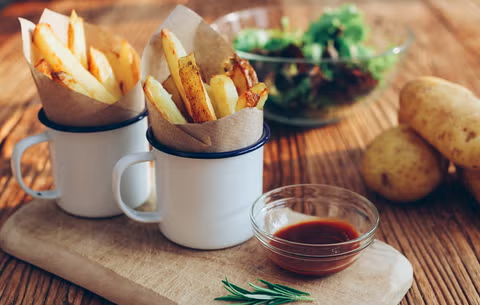
Unsplash
Lots of foods that aren't so great for you pass as vegan, like dairy-free ice cream and even certain Taco Bell menu items.
But that doesn't give you license to chow down as often as you please. "The problem I see when people transition to a vegan diet is that they often just focus on what to remove from their diet, but forget to replace or substitute that option with an equally nutritious alternative," says Sheth.
For instance, a plate of just vegetables and carbs, like white pasta, isn't exactly ideal. In addition, you should aim to incorporate some form of whole grains and lean protein, like the plant-based options mentioned above, to ensure a balanced meal, says Sheth.
She recommends keeping this guideline in mind: If you split your plate into three parts, half of it should contain fruits or vegetables, one fourth should contain whole grains, like brown rice or quinoa, and the rest should be your protein. You can tweak that ratio slightly to align it with your own fitness goals, depending on if you want to lose weight or build and maintain muscle.
Related: How Much Fat, Protein, and Carbs Should You Be Eating?
YOU MIGHT NOT LOSE WEIGHT
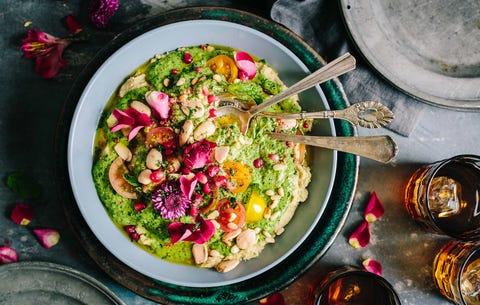
Unsplash
You can definitely drop pounds on a vegan diet. In a study published in the journal Nutrition, people who followed a vegan diet for six months lost an average of 16.5 pounds more than people who followed mainly plant-based diets (such as vegetarians or those who only ate seafood) and people who excluded no food groups.
When you cut out animal products completely, you're limiting your food choices in general, he says. Often, if you do it right, going vegan means you'll be eating more foods that are lower in calories, but higher in fiber, which can keep you feeling full and ultimately lead to weight loss.
But be warned that a vegan diet can spike the number on your scale, too. Protein is crucial when it comes to losing weight, due to the satiating effects it has on your appetite, explains Roussell.
By cutting out proteins like lean meat, dairy, and eggs, you run the risk of overeating carbohydrates, he says, which can quickly rack up in calories and lead to weight gain if you're not careful with the types of carbs you're eating.
Compliance is a main driver of weight loss, explains Roussell, so finding a diet you can stick to is your best chance at dropping pounds. With that, going vegan may work for some people, and be too restrictive for others. It really comes down to what you can stick with personally.
Related: The Best Way to Cut Carbs For Weight Loss
YOU COULD GET A LITTLE GASSY
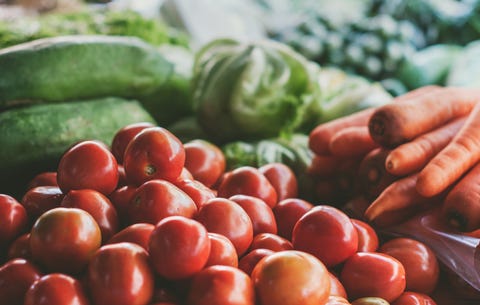
Unsplash
When you load your diet with vegetables and whole grains, you're also packing in tons of fiber, a common culprit of gas, according to the Mayo Clinic.
That's because your stomach and small intestine don't fully digest certain carbs, like fiber. These will just pass through to your bacteria-rich large intestine. Here, the bacteria will break that undigested fiber down, causing lots of farts, according to the National Institute of Diabetes and Digestive and Kidney Diseases.
Don't get us wrong — fiber is great for your heart and can even help control your weight. But constant gas can be uncomfortable. Some of the most common offenders? Vegetables like asparagus, broccoli, black beans, mushrooms, and cabbage. Fruits, like apples and peaches, and whole grains can also leave you gassy.
Try increasing your fiber intake slowly to avoid the gurgles. This will give your body time to adjust, suggests the National Institutes of Health.
How a Bean Becomes a Fart:
GOING VEGAN DOESN'T ALWAYS HAVE TO COST YOU MORE MONEY
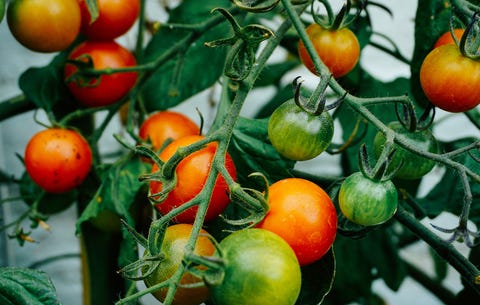
Unsplash
Like any other healthy diet out there, going vegan doesn't really mean you'll automatically be spending more money on groceries overall, says Sheth.
Plant-based foods, especially proteins like beans and lentils, can be significantly cheaper than animal protein sources. For instance, buying three or four cans of black beans will usually only run you a few dollars, a fraction of what a bag of frozen chicken breasts will cost you.
But consistently buying fresh fruits and vegetables and seeing them go bad before you eat them can seem like a waste. That's why you should plan ahead and practice prepping your meals in advance when you make the switch, says Sheth.
For instance, try loading up on frozen fruits and vegetables so you don't run the risk of having to toss them. (Plus, they have no nutritional difference compared to buying fresh.)
That way, you can control what and when you eat, says Sheth, saving you money in the long run.
Alisa Hrustic Deputy Editor, Prevention Alisa Hrustic is the deputy editor at Prevention, where she leads the brand's digital editorial strategy.
This content is created and maintained by a third party, and imported onto this page to help users provide their email addresses. You may be able to find more information about this and similar content at piano.io
Source: https://www.menshealth.com/nutrition/a19539781/vegan-diet-what-to-know-before-going-plant-based/
0 Response to "Plant-based Diet Pete Evans"
Post a Comment